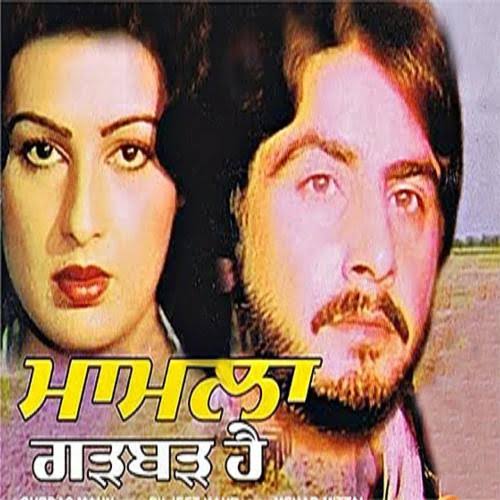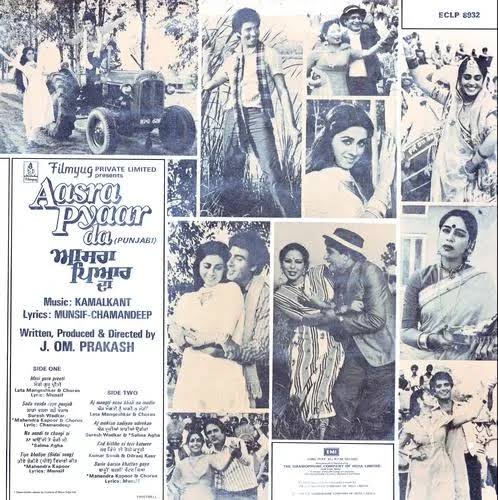In the film world, clashes between movies have been happening for years. Some of these clashes have turned into ugly mud-slinging battles. In Hindi cinema, especially back in the day, such clashes weren’t necessarily viewed negatively, as filmmakers believed that there was an audience for every film. It was quite normal for Hindi films to release together. But Punjabi cinema could never afford such clashes.
Back in the period between the 1970s and 1990s, only about 10 Punjabi films were released on average each year. So the chances of any major clash were quite low. However, one major clash became the talk of the trade.

The year was 1983, a time often remembered as one of the best years for Punjabi films at the box office. Two films—Aasra Pyar Da and Mamla Garbar Hai—were set to release just a week apart.
Aasra Pyar Da was directed and produced by big Hindi film producer J. Om Prakash (Hrithik Roshan’s maternal grandfather). The film starred Raj Babbar, who had become a top-tier name after hits like Nikaah and Insaf Ka Tarazu, although he still made time for Punjabi films. Alongside him was another known actor, Navin Nischol, and leading ladies Kirron Kher and Priti Sapru.
On the other hand, Mamla Garbar Hai was produced by Chandigarh-based Bhag Singh and directed by Hindi filmmaker Hari Dutt, who didn’t have a particularly strong filmography. However, the film had several strong points: its leading lady, Daljit Kaur, who already had a strong box office pull and was often called the Hema Malini of Punjabi cinema; and Gurdas Maan, who was making his debut as a lead actor. The film’s music was already a big hit, but there was some skepticism about Gurdas Maan in a lead role—as Punjabi singers typically only played side characters until then.

Another advantage for Aasra Pyar Da was J. Om Prakash’s control over the distribution circuit. His Hindi films had always done well, and with a wide release expected, there were strong assumptions that Aasra Pyar Da would also perform well.
While Mamla Garbar Hai had many positives going for it, it remained a risky project for first-time producer Bhag Singh.
Then, one fine day, a big Mercedes stopped outside Bhag Singh’s residence in Chandigarh. J. Om Prakash came to meet him. A few in the distribution circle were aware of the meeting and expected the clash might be avoided. During the meeting, J. Om Prakash reportedly told Bhag Singh:
“See Sardar ji, all my films have done well. Even Aasra Pyar Da will be a superhit. But your film shouldn’t suffer because of mine. If it releases alongside my film, it won’t do well.”
Bhag Singh didn’t like the tone in which things were put. He replied:
“I will not delay the release of my film. If you wish, you can change your release date.”
What could have been settled with gentlemanly conversation soon turned into an ego clash.
Mamla Garbar Hai released first and turned out to be a crowd-puller from day one. Bhag Singh received a telegram from veteran actor Pran, which read:
“Mamla hit hai.”
It was believed that things might change in the second week, with the release of Aasra Pyar Da. But surprisingly, the film was rejected by audiences from day two despite its wide release. While Aasra Pyar Da was pulled from theatres by its fourth week, Mamla Garbar Hai went on to celebrate silver jubilees at various centers—and even a golden jubilee through print circulation.
The trade felt that J. Om Prakash knew this outcome. First, he disliked that Punjab distributors pushed for a Mehar Mittal comedy role, which went against his filmmaking style—he never used comedy subplots in his Hindi films. He had originally envisioned Reena Roy for the lead, but casting newcomer Kirron Kher, who had no established image, proved to be a mistake. At one point, he even considered Asha Parekh or Daljit Kaur based on distributor suggestions, but things didn’t work out. Reaching out to Bhag Singh was his last attempt to save his film—but Aasra Pyar Da couldn’t find any aasra (support) or hope anywhere.
An interesting twist: it could have been a clash of sisters. Kirron Kher’s sister, Kanwal Kaur, was originally set to star in Mamla Garbar Hai, but Daljit Kaur stepped in at the last minute when Kanwal left the film.

